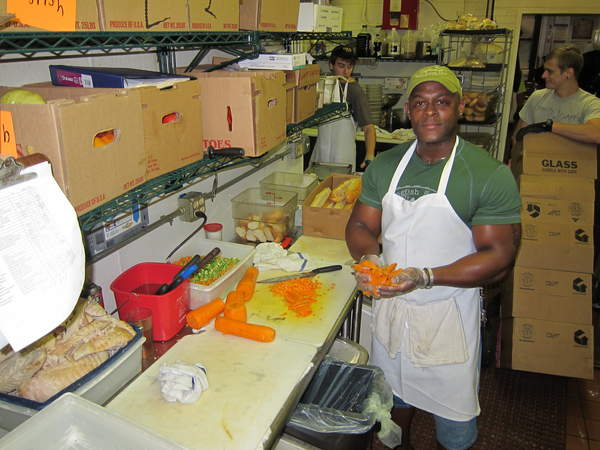Monday - Friday 7:00am to 4:00pm
Phone: (302) 732-3211

First it was farm to table; now it's table to farm By Dennis Forney | Aug 26, 2011
The farm-to-table movement has picked up momentum in the past few years.
More and more restaurateurs are proudly  featuring menu items with ingredients grown locally whether they be meat, seafood, fruits or vegetables.
featuring menu items with ingredients grown locally whether they be meat, seafood, fruits or vegetables.
Less well known is the more recent – reversed - table-to-farm movement that completes the cycle by taking food wastes and other organic materials from restaurants and returns them to the farm in the form of rich compost fertilizer to grow more food.
In the past few weeks, six local restaurants have started separating food wastes from their other trash. In a program known as Replenish, wastes are being picked up by Blue Hen Organics in Dagsboro, which is incorporating them into the compost it manufactures for sale throughout the region.
The next stop for D.C. Kuhns, Kim Furtado and Lori Lake, who are shepherding the program though their non-profit Eden organization, is to contact farmers growing for the restaurant industry. “We will contact farmers and the farmers’ market folks to encourage them to take advantage of the cheap prices being charged by Blue Hen Organics for the compost. The idea is to close the circle,” said Kuhns. “Let’s grow more food with what we throw away.
“And in the long run, we think there will be less and less polluted run-off going into our rivers and streams. There are about 575,000 acres of farmland in Delaware. Between 1998 and 2008, when pollution control strategies have been initiated, the number of acres devoted to growing fresh food for people has doubled from 2,000 to 4,000 acres. As that increases over time, there will be more and more farmers using compost to enrich their soil instead of depending entirely on petroleum-based fertilizers. That means less polluted run-off,” said Kuhns.
Program will reduce costs
Restaurants that have signed on so far include Dogfish Head Brewings and Eats, El Dorado, Matt Haley’s Blue Coast, Bethany Blues, Go Fish and. Restaurateurs aren’t just getting on board the recycling bandwagon because they think it’s the right thing to do. In the past few years tipping fees at the Sussex County landfill have practically doubled. Yard wastes have been banned from the landfills and in California and Oregon, where recycling has taken on almost religion status, other organic wastes – like leftover food - have been banned as well. Robert Tunnell of Blue Hen Organics, which also recycles yard wastes, said restaurant owners should be able to save up to 20 percent on their hauling fees by separating out their organic wastes. Since Blue Hen will be using the material in its compost, it will be charging less per ton of waste hauled than is charged per ton for what goes to the landfill.
‘We’re happy to get the organic material from the restaurants,” said Tunnell. “It’s more nitrogen rich and speeds up the composting process. It makes a better fertilizer and we don’t have to use poultry manure as much.”
Tunnell and his partner in the business, Shannon Argo, said they are setting up routes to collect the food wastes on Mondays, Wednesdays and Fridays. Restaurants owners and staff are being trained in the proper way to separate food wastes into buckets and other containers lined with compostable bags. “Fruits, vegetables, meat, shellfish, paper towels, napkins – anything organic that will break down,” said Tunnell.
Kuhns said in addition to the six restaurants now participating, another couple dozen have given verbal commitments. “By the end of the year we expect to have more than 50 involved. The process isn’t difficult but it has to be done right.”
Blue Hen is providing the pick-up service at no cost for the first 30 days. “We have to quantify how much we will be picking up before we can figure out the charges,” said Tunnell.
Green is gold
The mantra for the Eden program is: “An economy in harmony with the earth’s eco-system is the new Eden.” The group has received grants through the state’s renewable resources programs to further its mission of “fostering public awareness and educating community business leaders about economic and practical business models for the use and recovery of renewable resources in Delaware.” Eden is an acronym for Energize Delaware Now.
This innovative program is funded by several grant awards, including grants from the Department of Natural Resources and Environmental Control’s Greenhouse Gas Reduction Program, The Longwood Foundation, and Constellation Energy’s EcoStar Program.
“It’s very important that this be seen not as just a good thing to do for the world, but also something that’s good economically,” said Kuhns. “That’s why what we’re doing is part education and part demonstration. The difference between the cost of hauling these wastes to the landfills versus having them hauled to a composting facility is the economic foundation of this.”
Carol Everhart, president and CEO of the Rehoboth Beach-Dewey Beach Chamber of Commerce, said the program fits in with the goals of the chamber and the goals of its Destination Station Center project.
“As a chamber, we like it because it saves the businesses money. DSC – it’s exactly the type of programs we want to promote under that,” Everhart said.
She said the chamber has put out the word about the program to other Rehoboth businesses in an effort to get them to join.
Kuhns said the Rehoboth area has been chosen for this demonstration project because of the high concentration of restaurants. “We want participating restaurants to use this Replenish program as part of their marketing. This is all about replenishing the farm and the table.”